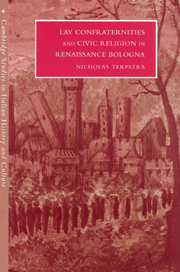Book contents
- Frontmatter
- Contents
- List of figures
- List of tables
- Acknowledgments
- Preface
- Prologue
- 1 The early quattrocento: confraternities, observance movements, and the civic cult
- 2 Lay spirituality and confraternal worship
- 3 The mechanics of membership
- 4 Communal identity, administration, and finances
- 5 Confraternal charity and the civic cult in the late fifteenth and early sixteenth centuries
- Epilogue
- Bibliography
- Index
4 - Communal identity, administration, and finances
Published online by Cambridge University Press: 24 September 2009
- Frontmatter
- Contents
- List of figures
- List of tables
- Acknowledgments
- Preface
- Prologue
- 1 The early quattrocento: confraternities, observance movements, and the civic cult
- 2 Lay spirituality and confraternal worship
- 3 The mechanics of membership
- 4 Communal identity, administration, and finances
- 5 Confraternal charity and the civic cult in the late fifteenth and early sixteenth centuries
- Epilogue
- Bibliography
- Index
Summary
Quattrocento Bolognese confraternities functioned as lay religious congregations whose members worked jointly to the goal of discipleship and salvation. Vowing neither poverty nor chastity, but valuing obedience and good order, they devised measures to preserve internal peace, and created administrations to oversee the ongoing communal life of the company. As some grew wealthier through multiplying legacies and investments, their administrations became less representative and more bureaucratic. By the early sixteenth century, confraternal statutes replaced pastoral injunctions with political models, and by the middle of the century some confraternal administrations put service to the patriciate ahead of service to the poor.
COMMUNITY
“The Holy Spirit speaks by the mouth of the prophet, saying ‘Depart from evil and do good’” (Psalm 34: 14). So began numerous sets of confraternal statutes in Bologna and elsewhere. Departing from evil and doing good were “the two parts of justice,” individually fruitless but joined together as the conditions of salvation. As seen in the previous chapter, most confraternities offered quite specific lists of the evil activities which members were to spurn. Doing good was more complex. It embraced worship, charity, and the catch-all phrase, “good life and reputation” (“bona vita e fama”). Neither avoiding evil nor doing good could be carried out in full individually.
- Type
- Chapter
- Information
- Lay Confraternities and Civic Religion in Renaissance Bologna , pp. 134 - 170Publisher: Cambridge University PressPrint publication year: 1995

